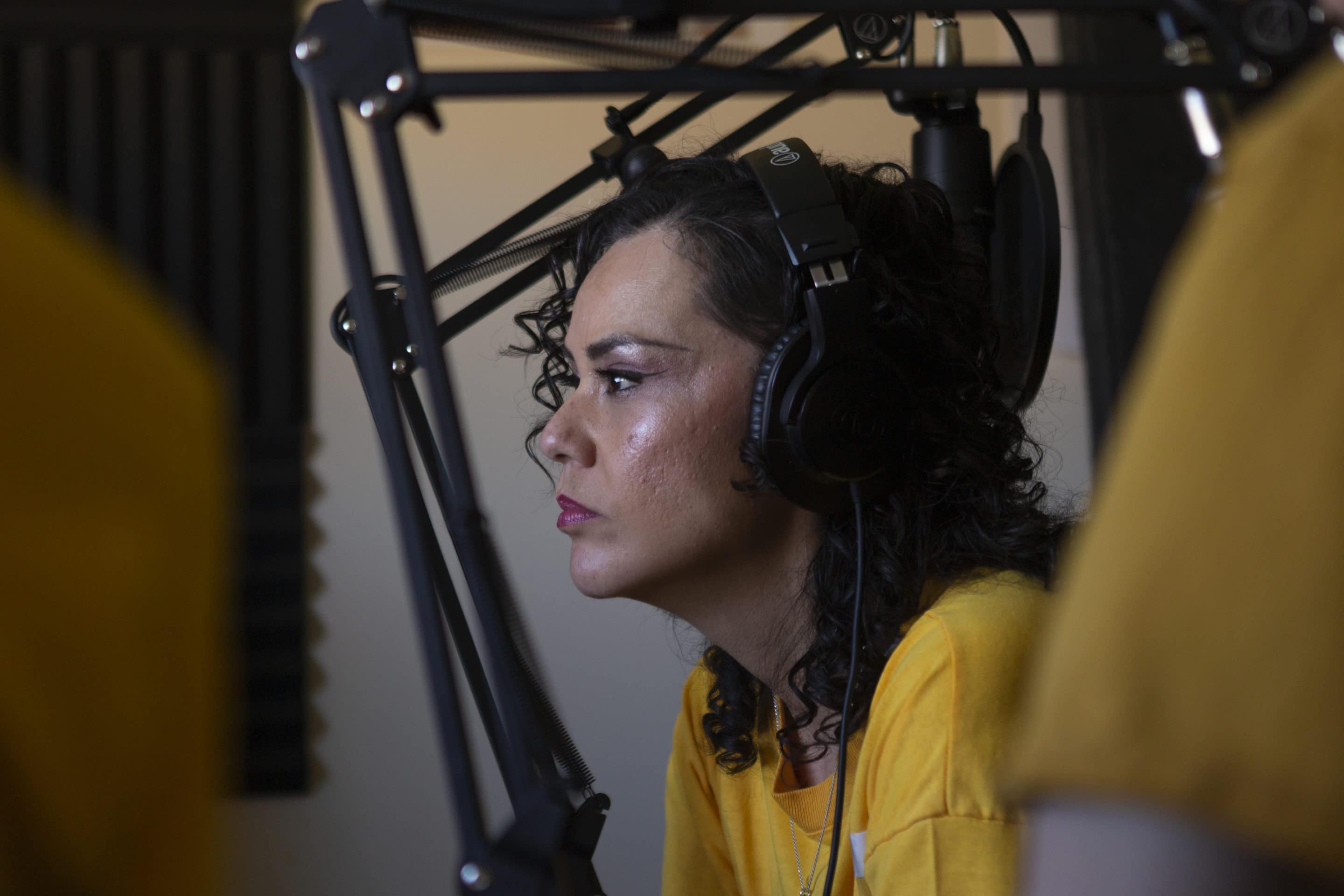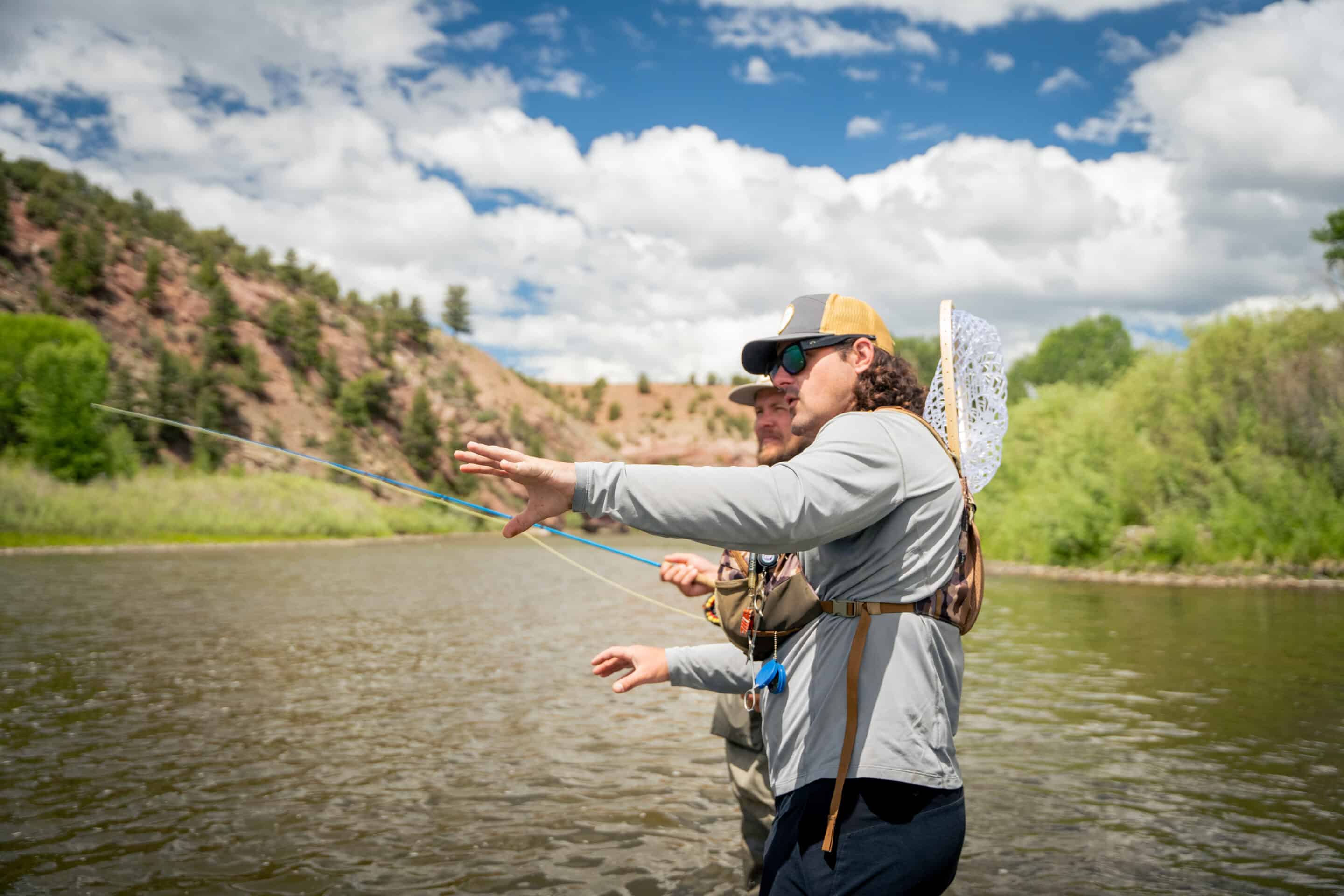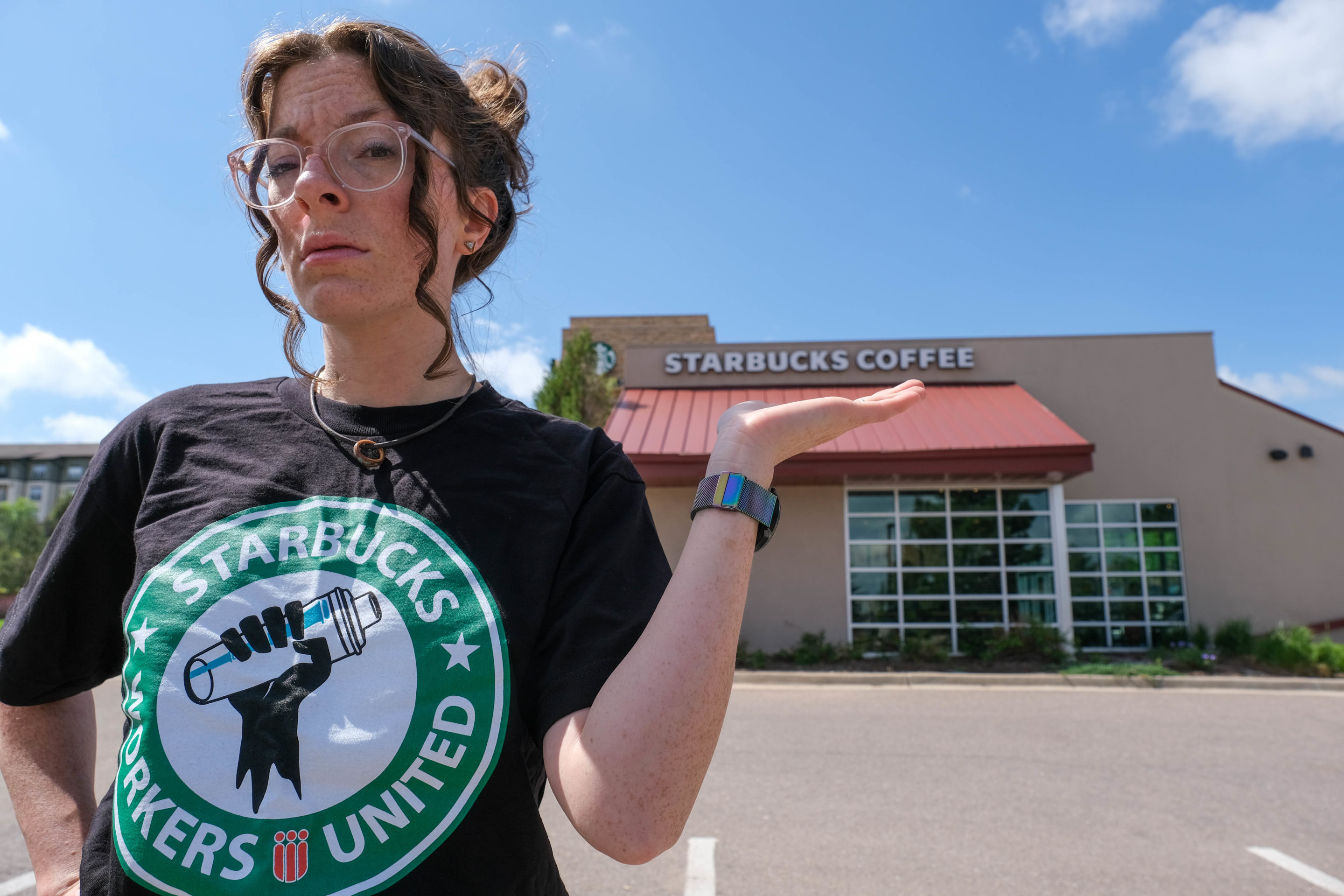// Cynthia Gonzalez works inside of the Inside Wire recording studio in the Denver Women’s Correctional Facility on May 25. She is a co-host of the Denver Women’s Correctional Facility arm of Inside Wire, the first statewide prison radio station by and for incarcerated residents. Photos by Ali Mai | [email protected]
Cynthia Gonzales said she coasted through the first 20 years of her life sentence at Denver Women’s Correctional Facility. In and out of solitary confinement and without the hope of parole, making a life for herself behind bars seemed impossible. That is, until she started finding programs like the radio show she now hosts and produces.
“Being a part of radio is something new to me,” Gonzales said. “I had no idea it was going to open my world like it did. Why I want to be a part of it now is because there’s a lot of people within the facility who have journeyed a lot in their lives, been through a lot. We’re all a community within here. I think that it’s important that we connect ourselves to the outside world, and that we share ourselves with the outside world. I like to be the voice for them.”
While hosting and producing her current radio shows didn’t solely inspire her new identity, it did lead her closer to a sense of fulfillment.
“Inside Wire” is a 24/7 radio station produced by incarcerated people across Colorado and the first statewide prison radio station in the U.S. The station is heard by inmates through commissary-purchased television sets and by those on the “outside” through the Inside Wire app. University of Denver’s Prison Arts Initiative supports the program that is created by 15 incarcerated producers at Denver Women’s, Limon and Sterling Correctional Facilities.
The music is eclectic, playing everything from Lil Jon to Joni Mitchell. The interviews are hard-hitting, including an “Ask Me Anything” style show with inmates, visitors from the outside and prison staff, such as the Executive Director of the Colorado Department of Corrections Dean Williams.
Shows include podcasts, talk, interviews, music and original music broadcast to the 14,000 incarcerated people within Colorado, but those behind the station believe they have a broader reach. Producers like Gonzales, Amber Pierce and Sarah Berry envision radio waves stretching across barbed wire, finding all Coloradans—prisoners, prison staff or otherwise.
“Someone who works in this environment or doesn’t work in this environment or me, someone who’s living in this environment, we all have our own stuff that we deal with,” Berry, who has served 13 years in a 48-year sentence for second-degree murder, said. “Understanding the prison world is different so there’s a bridging of the gap in that, but the foundation of it all is still the same.”
Gonzales points to small audio segments that she refers to as commercials and that function as audio palate cleansers. Recently, she produced one of these audio postcards on a trend that has been sweeping Denver Women’s: commissary cheesecake. Made from cream cheese, creamer and graham crackers purchased from the commissary, she imagined her fellow inmates and the “free world” being equally interested in the uniting force of cake.
Williams’ recent policy, titled Dynamic Security, acknowledges the humanizing force of a shared experience. The policy requires staff to interact with incarcerees on a personal level, interactions like sharing a meal, playing board games or being interviewed on the radio station.
“We’ve come so far in the last five years,” Pierce, who was charged with sexual exploitation of a child, said. “I’m serving an 18-year sentence, and I’m down 12-and-a-half years and the change in that time is huge. I respect the officers so much more now than I did then because of the way they respect us now. Then, they just looked at us like we were nothing.”
From the station’s advent, the goal was to create industry-standard shows with journalistic integrity while turning incarcerees who will leave the facility into competitive job candidates. Pierce hopes to take these skills into the world after prison and find a job in audio.
She came to the station through Gonzales, who functions as her mentor in a mentorship program Gonzales founded with two other inmates called Women of Influence. It’s the only program of its kind recognized by the state in the facility. Pierce said it was Gonzales who helped her find her purpose in “a place that will tear you down.”
Gonzales is the steady voice of the radio station, bringing others in, amplifying voices within the facility so all Coloradans hear their stories. She hopes that those on the outside see the humanity on the inside, while those on the inside see the humanity within themselves and one another. She recently interviewed a repeat offender who started a program in what Gonzales calls the most difficult part of the facility for incarcerees fresh out of solitary confinement or with many write-ups.
“[The prisoner] started this program that was highly successful where people sing, write poems, rap,” Gonzales said. “She showcased a lot of cool stuff, and I wanted to bring that onto the radio station. I showcased one of the songs; one of the girls rapped through it. It was just really cool that I could do that for her, that I could show her growth coming in and out of prison and that she’s helping other people in their growth and change.”
On March 31, 2022, the Colorado Senate acknowledged the power of programs like “Inside Wire.” Gov. Jared Polis signed Senate Bill 050, meant to modernize the Colorado Correctional Industries program shaped by the Correctional Industries Act of 1976 which mandated that said programs be profitable. This change allows for the expansion of work programs that better benefit the reentry and reintegration of the prison population, rather than turning a profit for the prison. In practice, this means more marketable skills and jobs with better pay that provide a chance for saving funds into a post-prison safety net, thereby decreasing recidivism.
“Why I coasted for all that time was because I had no hope, and that’s what happens when you don’t have no hope,” Gonzales said. “That’s what a lot of people living here are without. When you have no hope, you have no purpose; you’re just kind of sitting in here. What I try to do now and amplify through the radio station is that you’ve gotta have a purpose within yourself to give yourself a reason to get up every day.”
Incarcerees like Pierce, Berry and 95% of the Colorado prison population will leave prison and forge a new life with the outside population. While Berry doesn’t see herself staying in audio like Pierce, she believes the skills she learned at the station will serve her in a future career advocating for formerly-incarcerated women.
But for the “lifers” like Gonzales, hope takes on a different shape. She was convicted of felony murder at the age of 18 and now, at the age of 44, has spent the majority of her life on the inside. Without a chance of parole, in all likelihood, she will never return to her native Pueblo. Despite not knowing if she will ever return home, she maintains hope.
“Every day I learn something new in that radio station and it makes me happy. I know that every day I’m creating something new. I know that I’m about connecting the outside community with the inside community. I know that I have hope, and I don’t give up on hope. My hope is always fighting to see a light outside of here. I believe every for-lifer should fight for themselves to get out of here. You have to believe that you’re worth the fight.”
Enjoyed this story? Help us keep the lights on! Supporting local press ensures the stories you want to read keep coming, become a member for free today! Click here.





0 Comments